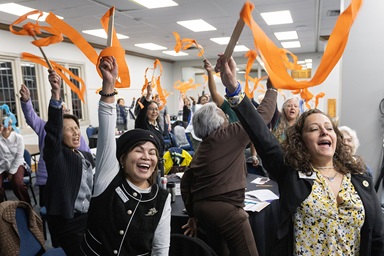The forced trafficking of workers is a growing problem that requires companies to look for accountability in their global supply chains.
That’s a concern of the Rev. David Schilling, a United Methodist pastor who serves as a senior program director for the Interfaith Center on Corporate Responsibility, whose members include United Methodist agencies.
“For us, the labor component (of trafficking) is highly underreported,” he said, adding that the focus is moving beyond establishing workplace standards to “raise the issue of how did workers get to the workplace?”
How faith communities are raising awareness about trafficking and empowering survivors is the focus of “Living in the Shadows: Religion’s Response to Human Trafficking,” aCBS-TV interfaith special that will begin airing on Dec. 15.
A 2012 survey by the International Labor Organization has found “well over 20 million” men, women and children who are victims of various forms of trafficking and slavery, Schilling said.
Even governments can play a direct role, he pointed out, as in Uzbekistan, where schools close three to four months so students as young as 10 can go to the cotton fields to bring in the harvest. “Many are not paid at all,” Schilling told United Methodist News Service.
In the United States, when agriculture, hotel or restaurant workers are brought in by labor brokers charging $5,000 or so, “that is a slippery slope to bonded slave labor,” he said.
ICCR has compileda statement on principles and recommended practices on human traffickingthat it will send to companies in January “to really look at what they are currently doing and if they aren’t doing anything, how to get started.”
The organization will start a major campaign in 2014 urging companies to adopt ethical recruiting protocols, which include prohibitions on workers having to pay to obtain employment. “That’s where you have that moment of exploitation,” Schilling explained.
Awareness at Super Bowl
United Methodist Womenhas taken on various forms of human trafficking as a focus,as Susie Johnson, staff executive for public policy, discusses during the broadcast.
For example, UMW members are among the volunteers who are approaching hotels in the New York metropolitan area to raise awareness about potential sex trafficking during Super Bowl XLVIII in New Jersey.
UMW is promoting an“Intercept the Traffickers Photo Campaign”to create awareness around the Super Bowl. UMW groups are encouraged to take photos of themselves in the snow, in the freezer section of a grocery or another “freezing” place, holding a sign that reads “Freeze! United Methodist Women is Intercepting Human Trafficking.”
Labor exploitation also is a UMW concern. Karen Prudente, who is interviewed in the CBS program, introduced the Damayan Migrant Workers Association - a grassroots advocacy organization in the New York/New Jersey area led by domestic workers - to the organization.
Many in vulnerable populations “have dreams of improving their standard of living,” Schilling noted, but without an ethical labor broker, they end up living in isolation and abuse. “Some of the great leaders in the anti-trafficking movement…are survivors who know this firsthand,” he said.
John P. Blessington is the executive producer and Liz Kineke is the producer of “Living in the Shadows.” The documentary is produced in cooperation with a consortium of Roman Catholic, Protestant, Jewish organizations, The Islamic Society of North America, and other interfaith organizations.
After the Dec. 15 air date, this program can be viewed online athttp://www.cbsnews.com/videos/living-in-the-shadows-religions-response-to-human-trafficking/.
*Bloom is a United Methodist News Service multimedia reporter based in New York. Follow her athttp://twitter.com/umcscribecontact her at (646) 369-3759 or[email protected].
Like what you're reading? Support the ministry of UM News! Your support ensures the latest denominational news, dynamic stories and informative articles will continue to connect our global community. Make a tax-deductible donation at ResourceUMC.org/GiveUMCom.




